Elderly Medical Transportation in Georgia: Reliable and Accessible Services
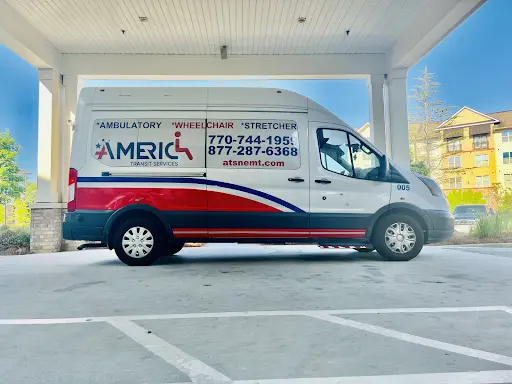
With a rapidly aging population, Georgia finds itself at a crossroads. How do we best serve the older adults in our communities who require regular medical care but may lack the necessary transportation? Isolation and inaccessibility, common challenges in the Old Age, could soon be a thing of the past in our state. Enter the world of Elderly Medical Transportation – a booming industry designed to offer reliable and accessible services, enabling elderly residents of Georgia to meet their healthcare needs on time and with dignity. Read on to understand how this sphere provides essential support for an age group that has given so much to our society.
NEMT Services offers safe and reliable non-emergency medical transportation services for elderly individuals throughout the state of Georgia. Highly trained drivers are equipped to handle a variety of medical needs, including wheelchair transportation and accompaniment to doctor appointments. Prioritize the comfort and well-being of the passengers and work closely with caregivers and healthcare professionals to ensure the highest level of care.
Georgia has specific regulations protecting its citizens who are 65 years of age or older, disabled adults who are 18 years of age or older and have dementia or Alzheimer’s disease, and people living in long-term care institutions.
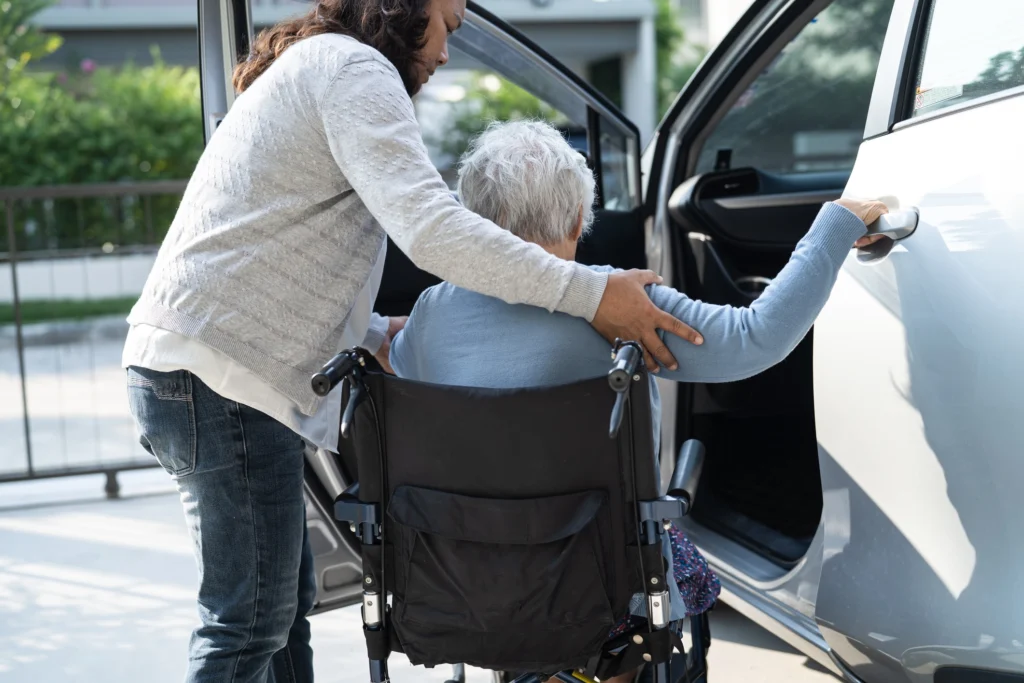
Assessing the Need for Elderly Medical Transportation in Georgia
Assessing the need for elderly medical transportation requires a comprehensive understanding of the challenges faced by seniors in accessing healthcare services. Factors such as limited mobility, health conditions, and lack of access to private transportation can greatly impact their ability to attend medical appointments or seek necessary treatments. Moreover, Georgia’s geographic layout and population distribution play a significant role in determining the need for reliable and accessible medical transportation services.
In rural areas where public transportation options are limited, seniors may face more substantial barriers in accessing healthcare. Long distances to medical facilities coupled with inadequate public transit infrastructure can make it especially challenging for elderly individuals to travel safely and comfortably. These circumstances highlight the critical importance of having specialized services that cater specifically to the needs of these vulnerable populations.
For instance, consider an elderly resident living in a remote area of Georgia who requires regular dialysis treatments. Without access to reliable transportation, they may be forced to endure long, arduous journeys on public buses or rely on family members who may have their own time constraints and obligations. Such circumstances could lead to missed appointments or delays in receiving crucial medical care, potentially exacerbating their health conditions.
To address this pressing need, specialized organizations and companies have emerged over the years, offering dedicated elderly medical transportation services in Georgia. These services aim to bridge the gap between healthcare providers and elderly patients who require transportation assistance. By providing door-to-door service from their residence to medical facilities and back, these services ensure that seniors can receive timely medical attention without compromising their well-being.
Now that we understand the importance of assessing the need for elderly medical transportation, it becomes essential to determine who is eligible for these services.
Who is Eligible?
Eligibility criteria for elderly medical transportation services in Georgia vary depending on the provider or organization offering them. Generally, these services cater to individuals aged 60 and above who face challenges in accessing healthcare due to limited mobility or lack of private transportation options. However, specific eligibility requirements can differ based on factors such as income level, disability status, and the type of medical appointments needed.
Many elderly medical transportation services prioritize individuals with disabilities or chronic health conditions that significantly impact their mobility. These individuals often require specialized vehicles equipped with wheelchair lifts or other accessibility features to ensure safe and comfortable transportation. Additionally, income-based eligibility criteria are common in some programs, ensuring that those with limited financial resources can also benefit from these services.
To illustrate, let’s consider a scenario where an elderly individual living on a fixed income cannot afford private transportation due to rising healthcare costs. If they need to undergo regular physical therapy sessions several times a week, a reliable and affordable transportation service becomes essential. In this case, they might meet the eligibility criteria for certain programs that provide free or subsidized transportation to low-income seniors.
It’s crucial for seniors and their caregivers to research and inquire about the specific eligibility requirements of different elderly medical transportation services in Georgia. This will help them identify the service provider best suited to meet their unique needs while aligning with their financial capabilities.
Elderly medical transportation services in Georgia have varying eligibility criteria and prioritize individuals with disabilities or chronic health conditions. Income-based eligibility is common, ensuring that low-income seniors can access affordable transportation for healthcare appointments. Seniors and caregivers should research and inquire about specific eligibility requirements to find the service provider that best meets their unique needs and financial capabilities.
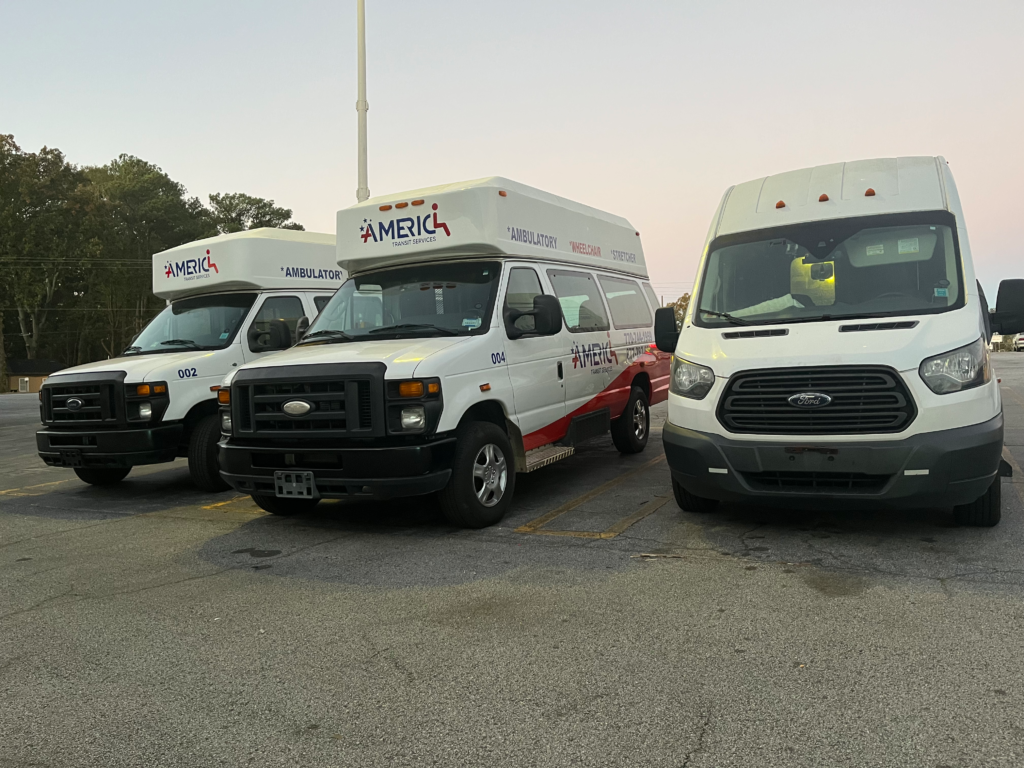
Varieties of Elderly Medical Transportation Services
When it comes to elderly medical transportation services in Georgia, there are a variety of options available to cater to the specific needs and circumstances of the elderly population. These services aim to ensure reliable and accessible transportation for medical appointments, treatments, and other healthcare-related requirements.
One common type of service is non-emergency medical transportation. This type of transportation is designed for individuals who require assistance or special accommodations but do not require immediate medical attention or emergency response. Non-emergency medical transportation providers offer scheduled pick-up and drop-off services, ensuring that elderly patients can attend routine doctor visits, therapy sessions, dialysis treatments, and other essential healthcare appointments.
Another aspect to consider is the availability of emergency medical transportation services. In situations where rapid medical intervention is necessary due to critical health conditions or injuries, these services play a vital role. Emergency medical transportation may involve ambulances equipped with paramedics or emergency medical technicians who provide immediate care during transport. Such services are essential when elderly patients experience severe chest pain, strokes, heart attacks or have sustained significant injuries requiring urgent care.
Additionally, both non-emergency and emergency medical transportation can be further classified into either shared ride or individual services. Shared ride services involve multiple passengers with similar destinations sharing the same vehicle. This option can be more cost-effective and suitable for instances where patients have flexibility in their schedule and are comfortable traveling with others. On the other hand, individual services provide dedicated transportation solely for one patient at a time, offering personalized attention and privacy during travel.
For instance, imagine an elderly person needing regular visits to multiple specialists spread throughout the month due to chronic illnesses. They might opt for shared ride non-emergency medical transportation as it accommodates their scheduling needs while also being economical.
Now that we’ve explored the different varieties of elderly medical transportation services available in Georgia, let’s delve deeper into the distinction between emergency and non-emergency services.
Emergency vs. Non-Emergency Services
The main differentiating factor between emergency and non-emergency medical transportation services lies in the urgency of the situation. Emergency services are typically reserved for critical situations where immediate medical attention is required to stabilize and preserve life. In these cases, ambulances staffed with trained medical professionals, equipped with necessary life-saving equipment, and able to provide prompt care during transit are dispatched.
Non-emergency medical transportation, on the other hand, caters to individuals who require transportation assistance for healthcare-related purposes but do not need immediate attention or rapid response. This can include follow-up visits, routine check-ups, physical therapy sessions, or scheduled treatments. Non-emergency transportation allows elderly patients to access essential healthcare services without burdening emergency resources that must prioritize critical cases where every second counts.
It’s important to understand the distinction between these two types of services so that appropriate resources are utilized efficiently and effectively. While emergencies require a prompt response from specialized personnel equipped for on-the-spot care, non-emergency transportation ensures that routine medical appointments are comfortably attended by elderly individuals without placing an unnecessary strain on emergency medical systems.
Now that we have a clear understanding of the differences between emergency and non-emergency services in elderly medical transportation, let’s continue exploring other relevant aspects of these services.
Shared Ride vs. Individual Services
When considering elderly medical transportation in Georgia, it’s important to understand the differences between shared ride and individual services. Shared ride services, also known as group transport, involve multiple passengers sharing a vehicle to reach their respective medical appointments. This option is typically more cost-effective as the expenses are divided among the passengers, making it a budget-friendly choice for individuals with limited financial resources.
However, shared rides can present some challenges as well. Scheduling conflicts may arise due to the need to coordinate with other passengers’ medical appointments and locations. Delays during pick-up and drop-off can also occur, as the driver has to accommodate multiple stops along the way. Despite these potential drawbacks, shared ride services can be a convenient and accessible option for elderly individuals who have some flexibility in their schedule and don’t mind sharing their journey with others.
On the other hand, individual services offer a more personalized experience. With individual transportation, the elderly person has exclusive access to a vehicle and receives undivided attention from the driver. This can be particularly beneficial for individuals with specific mobility needs or medical conditions that require extra assistance during transport. Individual services also provide more flexibility in terms of scheduling appointments, allowing for greater convenience and minimized waiting times.
For instance, consider Mrs. Johnson, an elderly woman who requires transport for her weekly dialysis appointments. Due to her health condition, she prefers individual services because they cater specifically to her needs. The driver assists her in getting in and out of the vehicle comfortably, ensures she arrives promptly at her destination, and provides any necessary assistance throughout the journey.
Both shared ride and individual services have their merits depending on the circumstances and preferences of the elderly individual. It is crucial to assess one’s specific requirements and prioritize factors such as cost-effectiveness, flexibility of scheduling, personal comfort, and level of assistance needed.
Now that we have explored shared ride and individual services, let’s delve into the aspects of pricing and accessibility when it comes to elderly medical transportation.
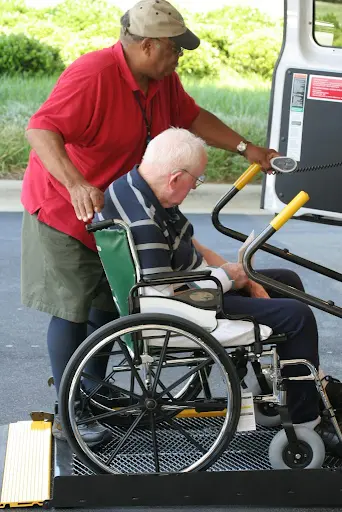
Pricing and Access to Elderly Medical Transportation
Affordability and access are crucial considerations when it comes to elderly medical transportation. The cost of these services can vary depending on multiple factors, such as distance traveled, duration of the trip, and the type of service selected (shared ride or individual). It’s important for elderly individuals and their families to understand pricing structures and explore potential financial assistance options, such as Medicare or Medicaid coverage, veteran benefits, or assistance programs provided by local organizations.
For example, Georgia’s Medicaid program offers Non-Emergency Medical Transportation (NEMT) that covers eligible individuals who require transport for medical treatments or appointments. This program helps alleviate the financial burden associated with medical transportation for those who qualify.
In terms of accessibility, it is essential to ensure that elderly individuals have access to reliable transportation services that meet their specific needs. Transportation providers should offer wheelchair-accessible vehicles, ensuring that individuals with mobility challenges can comfortably and safely travel to their appointments. Moreover, the availability of services in different areas within Georgia plays a vital role in expanding accessibility for all elderly residents.
Understanding the pricing structure and exploring available financial assistance programs is crucial in ensuring affordable access to quality elderly medical transportation. In the next section, we will delve into another critical aspect of these services – quality assurance through driver certification and vehicle standards.
Quality Assurance: Driver Certification and Vehicle Standards
Ensuring the safety and comfort of elderly individuals during medical transportation is paramount. This is why reliable and accessible services in Georgia focus on quality assurance, particularly through driver certification and vehicle standards. By implementing rigorous protocols, these services prioritize the well-being of their passengers.
The first aspect of quality assurance lies in driver certification. To guarantee that drivers possess the necessary skills and knowledge to handle medical transport for elderly individuals, they undergo thorough training and certification programs. These programs cover various areas such as defensive driving techniques, patient handling and communication skills, emergency response procedures, and understanding the specific needs of the elderly population.
For instance, drivers may receive training on how to safely assist individuals with mobility issues or cognitive impairments when entering or exiting the vehicle. This ensures that the driver is not only capable of operating the vehicle safely but also equipped to provide compassionate care and support to elderly passengers.
In addition to driver certification, reliable medical transportation services uphold stringent vehicle standards. The vehicles used in these services are regularly inspected to ensure compliance with safety regulations. This includes checking for appropriate seating arrangements, wheelchair accessibility features, functioning seatbelts, proper ventilation systems, adequate lighting, and secure storage for medical equipment or supplies.
Imagine an elderly individual who requires transport from their home to a medical facility for regular check-ups. With reliable medical transportation services in Georgia, they can be confident that the vehicle they will be riding in is not only comfortable but also designed with their specific needs in mind.
Adhering to high standards for both drivers and vehicles guarantees that elderly individuals receive safe and reliable transportation services when they need it most. These quality assurance measures not only prioritize passenger safety but also contribute to a sense of trust and confidence for both elderly individuals and their families.
Now that we understand the importance of driver certification and vehicle standards as part of quality assurance in elderly medical transportation, let’s explore other aspects that contribute to reliable and accessible services.
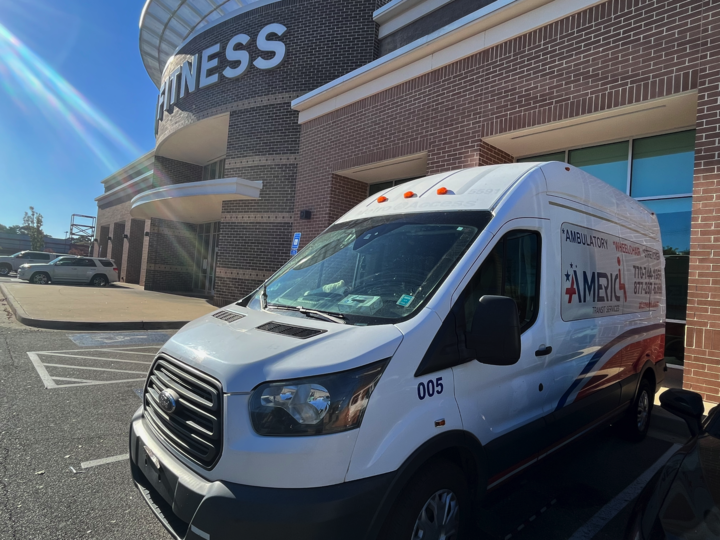
Elevating Elderly Care: Americ Transit Services Reliable and Accessible Medical Transportation in Georgia
Embark on a journey of compassionate care with Americ Transit Services, your trusted partner in Elderly Medical Transportation in Georgia. Our commitment is to provide not just transportation, but a reliable and accessible lifeline for the elderly community. Navigating the intricate web of medical appointments and healthcare visits can be challenging, but with Americ Transit Services, it becomes a seamless experience marked by comfort, safety, and reliability.
Our fleet of specially equipped vehicles is designed to cater to the unique needs of seniors, ensuring a comfortable and secure journey to and from medical appointments. We understand the importance of timely access to healthcare, and our team is dedicated to being a dependable bridge between your loved ones and the medical support they require.
What sets Americ Transit Services apart is not just our state-of-the-art vehicles, but our team of compassionate and trained professionals. Every trip is more than just a ride; it’s an opportunity to connect with our friendly and caring staff who prioritize the well-being and comfort of our elderly passengers. We go beyond transportation; we provide companionship, understanding, and a reassuring presence throughout the journey.
Reliability is at the core of our services. We pride ourselves on punctuality and efficiency, ensuring that your loved ones never miss a crucial appointment. Americ Transit Services understands the value of time and the peace of mind that comes with knowing you can trust your transportation partner.
Accessibility is not just a feature; it’s a commitment. Our services are designed to be accessible to all, with a focus on inclusivity and accommodating various mobility needs. From wheelchair-accessible vehicles to attentive assistance, we ensure that every passenger can experience the freedom of reliable transportation.
Choose Americ Transit Services for Elderly Medical Transportation in Georgia, where every ride is a journey of care, compassion, and reliability.Request a Ride now! Call us at (770) 744-1959. Let us be the bridge that connects your loved ones to the healthcare they deserve. Your peace of mind is our priority, and we are dedicated to making every trip a positive and empowering experience for the elderly community we serve.
Recent Comments